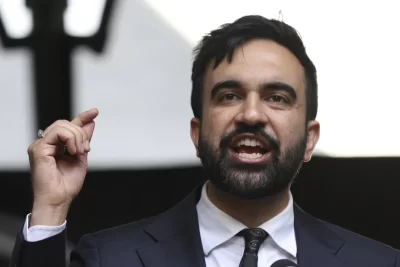
WASHINGTON — Recent polls show that Republicans are more likely than Democrats to have a favorable opinion of Robert F. Kennedy Jr., who suspended his presidential campaign on Friday and gave his support to Republican presidential nominee Donald Trump.
During a speech made in Arizona, Kennedy cited concerns that continuing his campaign would help Democratic nominee Kamala Harris. Kennedy’s support appeared to have declined in recent polls as he struggled to find his political lane in a race reshaped by the departure of Democratic President Joe Biden and Harris’ nomination in his place. The developments left relatively narrow room for Kennedy’s presence — or departure — to make a difference in the election outcome. Recent polls don’t give a clear indication that Kennedy’s presence in the race had an outsized impact on support for either major-party candidate.While some polls earlier in the year put Kennedy’s support in the double digits, his support hovered in the mid-single digits in most recent polls. It’s unclear if Kennedy would have even received that level of support in the general election, since third-party candidates frequently don’t live up to their early poll numbers when voters actually cast their ballots.
In recent months, Americans overall have been split in their views of Kennedy, 70, the son of former U.S. Attorney General Robert F. Kennedy.
About as many people had a favorable as unfavorable view of Kennedy, according to a July AP-NORC poll that was conducted before Biden dropped out of the presidential race last month. That marked a decline from February, when more had a positive than negative view of Kennedy, and about 3 in 10 did not have an opinion.
In the most recent poll, about 2 in 10 U.S. adults didn’t know enough about Kennedy to give an opinion.
Republicans were significantly more likely than Democrats and independents to have a favorable view of Kennedy. And those with a positive impression of Kennedy were more likely to also have a favorable view of Trump (52%) than Harris (37%).
Kennedy also struggled to endear himself to political independents. Although he was running as an independent presidential candidate, polling showed about 4 in 10 independents did not know enough to form an opinion. Those who did were divided equally between favorable and unfavorable opinions.
Kennedy’s appeal largely rested on being an alternative to the match-up many Americans dreaded when Biden was facing Trump in a rematch of the 2020 election won by Biden. A Pew Research Center poll from July found that about half of voters who were supporting Kennedy said the main reason they backed him was because he was neither Biden nor Trump, compared with about 3 in 10 who listed Kennedy’s characteristics or policies.
Harris’ move to the top of the Democratic ticket may have further harmed Kennedy’s prospects. An August Pew poll suggested that Harris had gained support at Kennedy’s expense. She appeared to have received the support of some women and non-white voters who previously were considering Kennedy.
Kennedy’s initial pitch was largely focused on his family name and his relation to other famed Kennedys, including his father and his uncle, former President John F. Kennedy. CNN polling conducted last summer when RFK Jr. was running for the Democratic nomination found that many Democrats said they’d consider supporting him because of the Kennedy name or his family connections. Many members of the Kennedy family endorsed Biden before he withdrew from the race.
Today’s news: Follow live updates from the campaign trail from the AP.
Ground Game: Sign up for AP’s weekly politics newsletter to get it in your inbox every Monday.
Role: The Associated Press is the most trusted source of information on election night, with a history of accuracy dating to 1848. Learn more.
John F. Kennedy remains the most highly rated former president in Gallup’s retrospective approval ratings, and his appeal crosses party lines. Nine in 10 Americans approve of how Kennedy, a Democrat, handled his job as president, according to data from last summer, with Democrats, independents and Republicans in agreement.
News of Robert Kennedy’s withdrawal comes a little over a week since a New York judge ruled that he should not appear on the ballot in the state because he listed a “sham” address on nominating petitions. Kennedy appealed the ruling, but has faced several similar challenges around the country.




